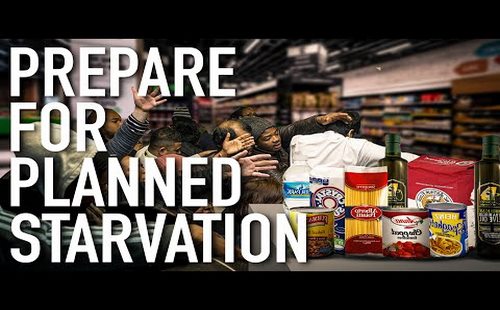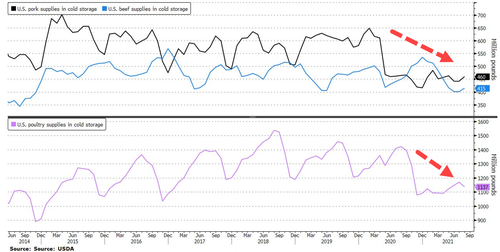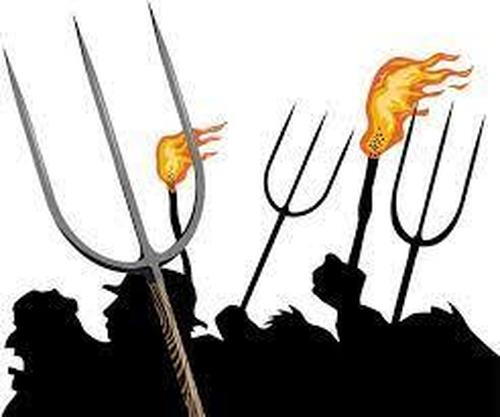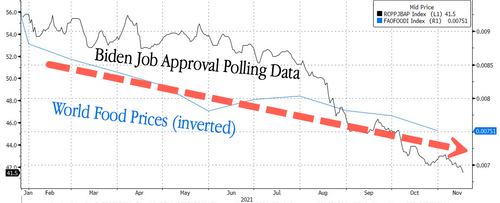Satan Soldier Biden’s New Plan To Tackle Rising Food Prices — Hide in His Basement
Food Shortages Are Here
Cargill CEO Ditches 'Team Transitory', Warns Of Persistent Food Inflation – Cargill Care About Cargill's Bottom Line, NOT Humanity Ability to Feed Their Families
Cargill CEO David MacLennan has changed his mind about "transitory" inflation and now believes it will be more persistent with higher food prices in 2022. He blamed elevated food prices on snarled supply chains, labor shortages, and adverse weather conditions, among other things.
MacLennan highlighted that labor shortages are a significant challenge for the food industry. He said food processing plants across the country operate at less than full capacity, which drives down food output and prices higher as demand remains robust.
"I thought inflation in ags and food was transitory. I feel less so now because of continued shortages in labor markets," MacLennan said during an interview at the Bloomberg New Economy Forum in Singapore. "That's one of the inputs to the supply chain that we're watching most carefully."
“I thought inflation in ags and food was transitory. I feel less so now because of continued shortages in labor markets” - Cargill CEO
— zerohedge (@zerohedge) November 17, 2021
In September, MacLennan was on record saying soaring food costs would be temporary and should recede. Though in the last few months, world food prices hit a new decade high in October, supply chain woes worsened, labor shortages at food processing plants to transportation to ports expanded, adverse weather conditions hit harvests, and transportation and energy costs skyrocketed. It seems the food executive has ditched "team transitory" for a more logical understanding of today's inflationary environment, one that is persistent.
"When you have limited supply, that can lead to higher prices," he said.
MacLennan is late to the party in abandoning the "transitory" narrative.
Already, we've reported food inflation and shortages have hit supermarkets, not just in emerging markets but also in the developed world. In the US, Mondelez CEO Dirk Van de Put recently told CNBC that Oreo cookies, Ritz crackers, and Sour Patch Kids would be more expensive next year. There's been chatter that Nabisco, PepsiCo, and Coca-Cola will be raising prices, and Kraft Heinz has told consumers that they must get used to "higher prices."
Consumers are spending more on food than a year ago. Some have blamed President Biden for the inflation eating away their real wages as polling numbers for the president sink.
So what's Biden's plan to tackle soaring food costs as his administration runs from one crisis to another? Are price controls next? Source: ZeroHedge
We hate: Low and vulgar things; crooked deals; false teaching; those undecided to obey God;
every other way; lies and falsehood; God's enemies; evil; pride; arrogance; corruption; deceit;
our son if we don't discipline; dishonesty; bribes; hates himself if a thief; time for hating; idols;
father, mother, wife, children, brothers, sisters and own life (Luke 14:26); licentious deeds; sexual sin and idol feasts (taken from 19 scripture verses).
LIST OF SCRIPTURES
Deut. 16:22 (Worship images)
Job 34:17 (God hates rightfully)
Psa. 5:5 (Proud sinners)
Psa. 11:5 (Violence)
Psa. 45:7 (Wrong)
Psa. 97:10 (Evil)
Psa. 101:3 (Deals)
Evergrande’s going down. And it’s taking the life savings of countless good people down with it.
But while Evergrande’s going down. Food prices are going up. Moreover, they’re going up a lot.
Satan Soldiers Plandemic: US Food Banks Warn Soaring Prices Will Affect Distributions They’re Also Affecting the
Mission of Us Food Banks Who Are Spending a Lot More on Food Than Ever Before…

US Meat Prices To Remain Elevated Amid Depleted Reserves
Beef, pork, and chicken in US cold storage warehouses have yet to recover from pandemic lows and could continue to support higher prices.
New United States Department of Agriculture (USDA) data shows beef reserves dropped 7.7% from a year ago in August, poultry supplies fell 20%, and pork plunged 44% to their lowest levels since 2017, according to Bloomberg.

Jim Sullivan, commercial director for Stable USA, said low meat inventories would suggest meat prices will stay elevated.https://hnewswire.com/major-food-companies-to-start-jacking-up-food-prices-we/embed/#?secret=CxPxcXQbvvhttps://hnewswire.com/many-people-will-head-to-food-banks-in-order-to-feed-their-families/embed/#?secret=zTlVqKDpw9
“Prices remain very elevated compared to seasonal expectations,” Sullivan said.
Soaring supermarket prices have been on the radar of the Biden administration as working-poor families allocate a high percentage of their incomes to basic and essential items. Higher food inflation eats away their wages and is why Biden recently increased SNAP benefits by a quarter.
Earlier this month, the Biden administration finally addressed inflation as a concern but didn’t blame the trillions of dollars in fiscal and monetary policies and labor shortages on increased food inflation but instead placed responsibility on meatpackers.
White House National Economic Council Director Brian Deese said “pandemic profiteering” food companies are driving up supermarket costs for Americans. This is nothing more than a blame game and failed government policies that have not just increased food prices but have left supply chains reeling due to stimulus checks that disincentivized workers from working.
New data of low meat supply at US cold storage facility is more bad news for the Biden administration, who will have to develop a new narrative about why meat prices aren’t going down. If food inflation remains elevated into early next year, Americans might vote with their wallets during next year’s midterms. Source: ZeroHedge

According to the United Nations Food and Agriculture Organization (FAO), global food prices were up nearly 33 percent year over year in August. Vegetable oil, grains, and meat all cost more. Unfortunately, rising food prices – and empty stomachs – often presage social chaos and revolution.
If you recall, a decade ago food inflation triggered the Arab Spring uprisings across the Middle East and North Africa. And food shortages were commonplace in Communist Romania in the 1980s. That was before the country’s dictator Nicolae Ceausescu was overthrown, tried by a kangaroo court, lined up against a wall, and executed by firing squad on Christmas Day in 1989.
Rare is the revolution ignited by a populace with a full stomach. Historically, surges against an oppressive regime are sparked by a steep and extended rise in food prices.
Leading up to the French Revolution, for example, famines were frequent. In one instance, when Louis XVI’s clueless wife, Marie Antoinette, learned the peasants had no bread, she remarked, “let them eat cake.”
What followed were the Flour War riots. Not long after that, Louis XVI’s head rolled off the guillotine chopping block. Then things really got bad.
The Reign of Terror, led by the woke Jacobins, reigned over the land. And the assignat currency, backed by land seized from the Catholic Church, blew up in a destructive episode of hyperinflation. Before it was over Napoleon had channeled the discontent of a generation into a damaging misadventure to invade all of Europe.
If only there had been a little more bread to go around.
“I Don’t Eat Bread”
When adjusted for inflation and annualized, the cost of food is higher than nearly anytime in the past six decades, according to FAO data. Alastair Smith, senior teaching fellow in global sustainable development at Warwick University in the United Kingdom, recently noted:
“Food is more expensive today than it has been for the vast majority of modern recorded history.”
Governments officials from Tunisia, Egypt, Morocco, Romania, India, Turkey, Russia, and many more, are working overtime to somehow combat the menace of rising food prices. Price controls, export taxes, fines, subsidies, trade restrictions…you name it.
With a little luck, these efforts will support lower prices in the short-term. But these failed policies always make things worse in the long-term. When government officials artificially set the price of something below what it costs to produce they guarantee that supply will disappear.
The Prime Minister of Romania, Florin Citu, is taking a more pragmatic approach. He’s determined to avoid Ceausescu fate. Thus, he wants to reduce his country’s dependence on imported processed foods. He thinks this will reduce costs and narrow the trade deficit.
We wish him well. When recently asked about the rising cost of a loaf of bread, he remarked: “I don’t eat bread.”
Does he eat cake?
Yet it’s not just developing countries that are feeling the pinch…
In the United Kingdom, for example, rising natural gas prices are threatening the food supply. Several fertilizer plants in the UK have had to suspend operations because of soaring natural gas prices. And now carbon dioxide, a byproduct of fertilizer production, is in short supply.
Carbon dioxide, if you didn’t know, is used to stun chickens and pigs before slaughter, and for packaging and dry ice to keep meats frozen during delivery. Without carbon dioxide, the food supply chain breaks. Already, deliveries of frozen food to customers have been halted.
Who would have thought that carbon dioxide, something world improvers consider a poisonous greenhouse gas, was so valuable?
President Biden’s New Plan to Tackle Rising Food Prices
Here in the USA rising food prices have Whitehouse staffers working overtime too. Their primary purpose at this point is to assign blame to someone else.
Government lockdowns and the resulting supply chain breaks and labor shortages are mysteriously overlooked as causes of rising food prices. The creation of upwards of $4 trillion in printing press money is largely ignored…other than noting that government stimulus kept per capita demand for meat steady.
No, in the eyes of Whitehouse staffers the government can do no wrong. Instead, these scholarly elites have come up with a real boogeyman for people to rail against. In their very own Whitehouse blog – chock-full of bar charts, line graphs, and infographics – their culprit is explicitly identified.
According to President Biden’s underlings, rising food prices in America are the direct result of “pandemic profiteering” by the four large meat processing companies. Here’s their rationale:
“Four large conglomerates overwhelmingly control meat supply chains, driving down earnings for farmers while driving up prices for consumers. The meatpacking industry buys cattle, hogs, and chickens from farmers and ranchers, processes it, and then sells beef, pork, and poultry on to retailers like grocery stores. The industry is highly consolidated, and serves as a key choke point in the supply chain.
“That consolidation gives these middlemen the power to squeeze both consumers and farmers and ranchers. There’s a long history of these giant meat processors making more and more, while families pay more at the grocery store and farmers and ranchers earn less for their products. Absent this corporate consolidation, prices would be lower for consumers and fairer for farmers and ranchers.”
To be clear, we have little inside knowledge of the meat processing industry. From what we can tell it’s likely just as corrupt and crooked as the banking industry, the auto industry, the oil industry, the retail industry, the healthcare industry, the high-tech industry, the mining industry, the entertainment industry, and every other industry out there.
Quite frankly, there’s no industry left that hasn’t been spoiled and besmirched by one fraud or another. But no industry is more crooked than the U.S. government. And like most policy reports outlining the case for ramping up government intervention, the argument is incomplete.
Do the authors know why the meat processing industry consolidated in the first place? Do the authors really know that absent consolidation prices would be lower for consumers?
In truth, they care little about the answer to these questions. What they care about is that consolidation in the meat processing industry makes a good story for why food prices are rising. What’s more, this story provides justification for the government to spend gobs of money that isn’t theirs for the noble purpose of making the world a more comfortable and agreeable place.
Per the Whitehouse blog:
“As we restart the world’s largest economy and make great strides in the economic recovery, the Biden-Harris Administration is committed to restarting right for the American people—consumers and producers alike—by transforming the food system. This is a pivotal moment of opportunity to build back a better food system that is fair, competitive, distributed, and resilient.”
Hence, President Biden proposes to tackle the meat processing industry head on. He plans to funnel $1.4 billion in COVID-19 pandemic stimulus money to small meat producers and workers. He promises to “crack down on illegal price fixing.” He’s also formed a new White House Competition Council to “make the food system fairer and more equitable.”
Without question, anyone with half their marbles already knows how this story ends…

Government intervention discourages production, inflates prices, and, if pushed far enough, leads to empty shelves at the supermarket. After that, it leads to empty stomachs…and the social chaos that follows.
Source: ZeroHedge HNewsWire HNewsWire HNewsWire HNewsWire HNewsWire

You Would Have to Be Blind Not to See Where This Is Going, "Yoked"…
How Long Before USA Says: We Will Not Comply?
StevieRay Hansen
Editor,
HNewsWire.com
HNewsWire: “In October, November and December, There Will Be a Terrible Death Rate, Globally” Will Occur “Exclusively” With Vaccinated People. “Those Deaths Will Be Labeled Swiftly as a New Variant Strain of Covid
Trust-WHO-FDA-CDC-GOV.-HELL-NO — TrustGOD Only

